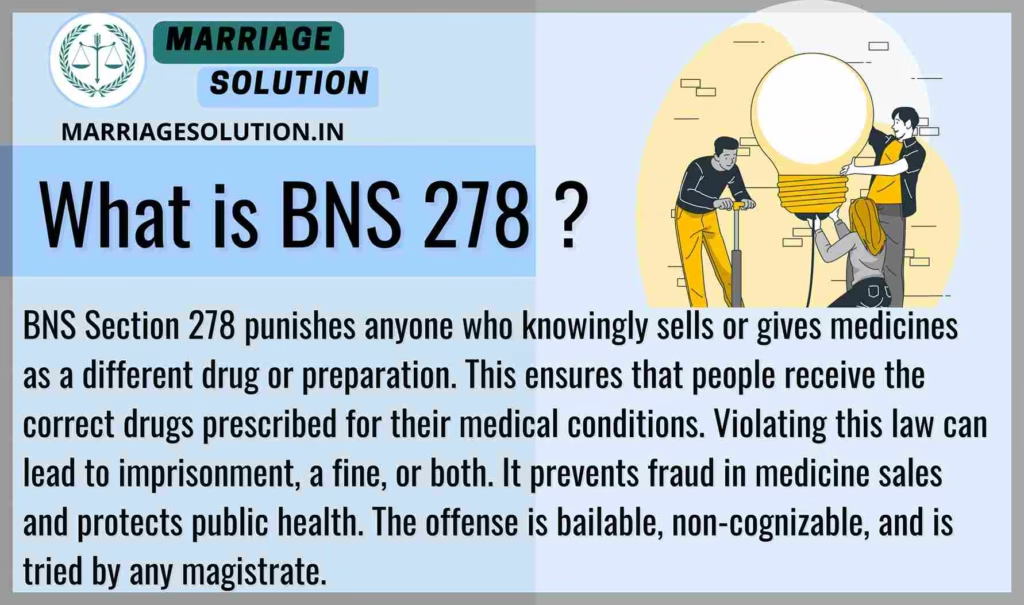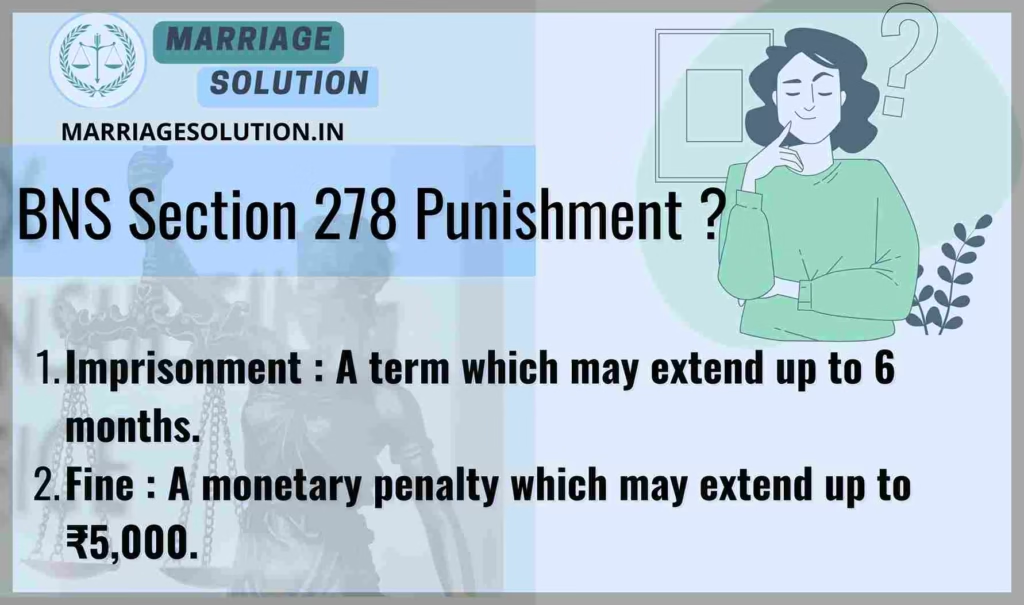Introduction of 278 BNS
Medicines save lives only when they are genuine and accurately prescribed. Selling or issuing drugs as something different than what they really are can have serious, life-threatening consequences. To address this, the Bharatiya Nyaya Sanhita (BNS) Section 278 penalizes anyone who knowingly misrepresents or substitutes drugs. By criminalizing such fraudulent practices, this law ensures transparency, trust, and safety in India’s healthcare and pharmaceutical sectors.
The Bharatiya Nyaya Sanhita (BNS) Section 277 replaces the old Indian Penal Code (IPC) Section 278.
What is BNS Section 278 ?
BNS Section 278 punishes anyone who knowingly sells or gives medicines as a different drug or preparation. This ensures that people receive the correct drugs prescribed for their medical conditions. Violating this law can lead to imprisonment, a fine, or both. It prevents fraud in medicine sales and protects public health. The offense is bailable, non-cognizable, and is tried by any magistrate.

Under Section 278 of the bns act 2023
Whoever sells, offers, exposes, or issues any drug or medical preparation as a different drug or preparation, knowing it to be false, shall be punished with imprisonment up to six months, or fine up to ₹5,000, or both.
1. Meaning of the Provision
This section punishes the misrepresentation of medicines.
- If a drug is knowingly sold or issued as something different from what it actually is, it becomes an offense.
- “Sale” covers direct transactions to customers.
- “Offer, expose, or issue” covers shop displays, dispensary distribution, or even advertisements.
- The law ensures patients get the correct drug prescribed, preventing medical fraud.
2. Scope of the Law
- Applies to pharmacists, chemists, dispensaries, hospitals, and drug sellers.
- Covers all drug forms — tablets, syrups, injections, ointments.
- Ensures accountability at every level of the drug distribution chain.
3. Essential Ingredients
To prove an offense under Section 278, it must be shown that:
- The accused sold, offered, exposed, or issued a drug.
- The drug was presented as a different drug or preparation.
- The accused knew or had reason to believe that the misrepresentation was false.
4. Examples of BNS 278
- Example 1: A pharmacist knowingly sells a painkiller as an antibiotic due to stock shortages.
- Example 2: A dispensary issues mislabeled cough syrup that is actually a vitamin solution.
- Not Covered: A seller unknowingly issues the wrong drug due to a supplier’s mistake, without negligence.
5. Punishment under BNS Section 278
- Imprisonment → Up to 6 months.
- Fine → Up to ₹5,000.
- Both → Court may impose both in serious cases.
6. Legal Classification
- Bailable → Accused has right to bail.
- Non-Cognizable → Police need Magistrate’s order to investigate.
- Non-Compoundable → Cannot be privately settled.
- Triable by → Any Magistrate.
7. Importance of BNS Section 278
- Protects patients from wrong or mislabeled medicines.
- Ensures trust in healthcare and pharmaceutical practices.
- Prevents fraud in medicine sales and distribution.
- Promotes ethical practices in drug labeling and dispensing.
Section 278 BNS Overview
BNS Section 278 punishes individuals who knowingly sell, offer, or distribute drugs or medical preparations as something different from what they actually are. This law is designed to protect public health and ensure that medicines sold are genuine and accurate to their description.
Key Points of BNS Section 278
- Misrepresentation of Drugs
- The section applies when a person knowingly sells or offers a drug under a false label or as a different preparation.
- This includes drugs that are mislabeled, misbranded, or substituted without the consumer’s knowledge.
- It ensures patients receive the correct medication prescribed for their health needs.
- Knowingly Committed
- The offense must be committed with full knowledge of the drug being sold incorrectly.
- Innocent mistakes or unintentional errors do not fall under this provision.
- This ensures accountability while protecting those who unintentionally mislabel or sell medicines.
- Protection of Public Health
- The law safeguards people from consuming incorrect or harmful drugs that may lead to health risks.
- Mislabeled drugs can cause serious side effects or fail to treat the intended condition.
- The provision builds trust in the pharmaceutical and healthcare system.
- Scope of the Law
- The section covers not just sellers but also dispensaries issuing drugs for medicinal purposes.
- Any person involved in misrepresenting a drug as something else can be held accountable.
- The scope extends to all forms of sales, whether physical or online.
- Punishment for Violation
- Violators face imprisonment for up to six months or a fine of up to ₹5,000, or both.
- The punishment acts as a deterrent to discourage fraudulent practices in medicine sales.
- The severity of the punishment depends on the extent of the violation and its impact.
- Legal Classification
- The offense is non-cognizable, meaning police require prior approval from a magistrate to take action.
- It is bailable, allowing the accused to secure bail and avoid detention during the trial process.
- The case is triable by any magistrate, ensuring flexibility in judicial proceedings.
- Accountability in Dispensaries
- The law applies to medical dispensaries that issue drugs for medicinal purposes.
- Dispensaries are responsible for ensuring that the drugs they issue match prescriptions.
- Failure to comply makes the dispensary or responsible individuals liable under this section.
- Safeguards Against Fraud
- BNS Section 278 prevents fraudulent practices in the pharmaceutical industry.
- It protects consumers from exploitation by sellers offering cheaper or counterfeit drugs as genuine ones.
- This provision ensures fairness and honesty in drug sales and distribution.
- Encouragement of Ethical Practices
- By enforcing strict penalties, the law encourages sellers and dispensaries to maintain ethical practices.
- Accurate labeling and selling of drugs become a priority for compliance.
- This contributes to an overall improvement in the healthcare sector’s reliability.
- Consumer Awareness and Protection
- The law indirectly promotes consumer awareness by ensuring accurate drug descriptions.
- It empowers consumers to trust the medicines they purchase or are prescribed.
- Public confidence in healthcare systems is enhanced through such legal provisions.
Examples of BNS Section 278
- Example 1: Selling Incorrect Medication
A pharmacist knowingly sells a painkiller as an antibiotic because the antibiotic is out of stock. The patient, unaware of the substitution, consumes the painkiller, which fails to treat their infection. Under BNS Section 278, the pharmacist is liable for misrepresenting the drug and endangering the patient’s health. - Example 2: Issuing Mislabeled Drugs
A dispensary provides a syrup labeled for cough relief but filled with a multivitamin solution. The consumer experiences no relief from their symptoms and discovers the mislabeling. The dispensary is held accountable under BNS Section 278 for knowingly issuing a different preparation.
BNS 278 Punishment
- Imprisonment
- A term which may extend up to 6 months.
- Fine
- A monetary penalty which may extend up to ₹5,000.

BNS 278 bailable or not ?
Bailable: The accused can seek bail from the magistrate and cannot be denied it as a right.
Comparison: BNS Section 278 vs IPC Section 276
| Section | What it Means | Punishment / Consequence | Bailable | Cognizable | Trial By |
|---|---|---|---|---|---|
| BNS Section 278 | Penalizes selling, offering, exposing, or issuing any drug as a different drug or preparation knowingly or falsely. Protects patients from misrepresented or mislabeled medicines. | Imprisonment up to 6 months, or fine up to ₹5,000, or both. Applies when misrepresentation is done knowingly. | Bailable | Non-Cognizable | Any Magistrate |
| IPC Section 276 (Old) | Covered selling or offering any drug as a different drug when done knowingly. Applied mainly to sellers misrepresenting medicines. | Imprisonment up to 6 months, or fine, or both. Punishment same as BNS but with limited scope and outdated terminology. | Bailable | Non-Cognizable | Any Magistrate |
| Key Difference: BNS Section 278 broadens IPC Section 276 by including dispensaries, hospitals, and online drug sellers, ensuring modern coverage and accountability in India’s pharmaceutical system. | |||||
BNS Section 278 FAQs
What is BNS Section 278 about?
It penalizes individuals who knowingly sell or distribute drugs as a different drug or medical preparation.
What is the punishment under BNS Section 278?
The punishment can be up to 6 months of imprisonment, a fine of up to ₹5,000, or both.
BNS 278 Is the offense bailable?
Yes, the offense is bailable, meaning the accused can secure bail as a matter of right.
BNS 278 Is the offense cognizable?
No, it is a non-cognizable offense, requiring prior approval from a magistrate for police action.
Who tries cases under BNS Section 278?
Cases are triable by any magistrate, ensuring accessibility to justice.
Why is this BNS 278 law important?
It ensures the safety of patients by preventing the sale of incorrect or mislabeled drugs, thus protecting public health.
Conclusion
BNS Section 278 ensures that patients receive the right medicines they are prescribed. By penalizing the misrepresentation of drugs, the law promotes accountability and honesty in pharmacies, dispensaries, and the pharmaceutical industry. Its classification as bailable, non-cognizable, and non-compoundable balances fairness with strong public health protection. Ultimately, Section 278 plays a key role in safeguarding consumer trust, preventing medical fraud, and protecting public health in India.
Need Legal Support?
If you are dealing with court cases, marriage problems, or any other legal issue, our team at Marriage Solution – Lawyer Help is here for you. Simply fill out our quick online enquiry form, and we’ll connect you with the right legal expert to support your needs.
Finished with BNS 278 ? Continue exploring the next provisions of the Bharatiya Nyaya Sanhita (BNS), 2023. Each section includes explanations, examples, and plain-language breakdowns for easy understanding.
- 279 BNS : Fouling water of public spring or reservoir.
- https://marriagesolution.in/bns_section/279-bns/
- 280 BNS : Making atmosphere noxious to health.
- https://marriagesolution.in/bns_section/280-bns/
- 281 BNS : Rash driving or riding on a public way.
- https://marriagesolution.in/bns_section/281-bns/
- 282 BNS : Rash navigation of vessel.
- https://marriagesolution.in/bns_section/282-bns/
- 283 BNS : Exhibition of false light, mark or buoy.
- https://marriagesolution.in/bns_section/283-bns/
Full IPC Section List: https://marriagesolution.in/ipc-section-list
All Indian Law & Blogs: https://marriagesolution.in/indian-law/
Full BNSS Section List: https://marriagesolution.in/bnss_section-list
